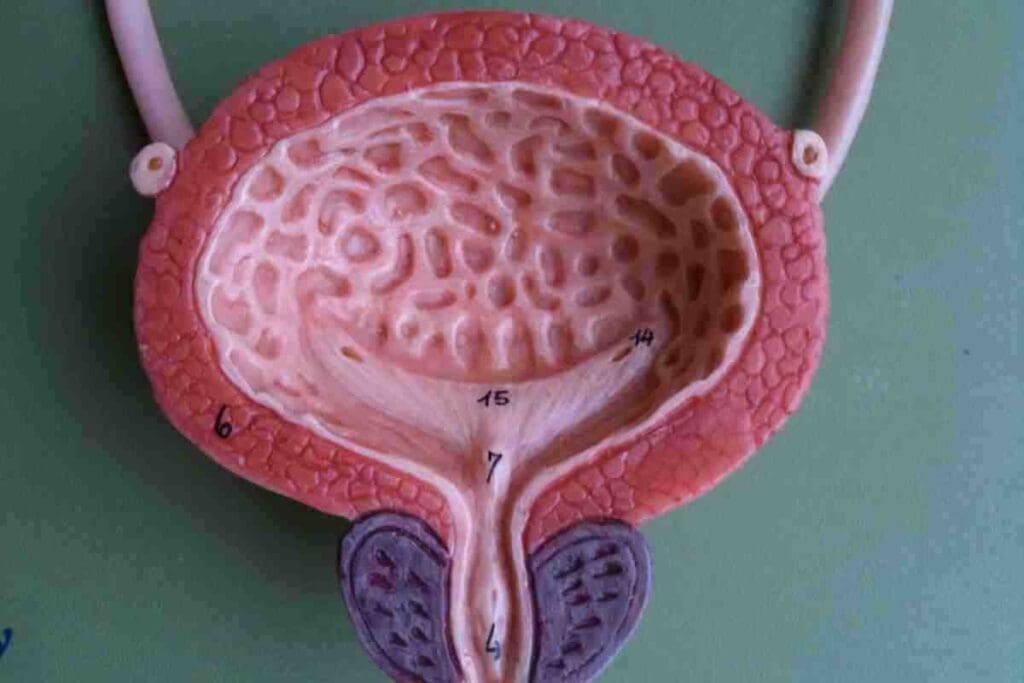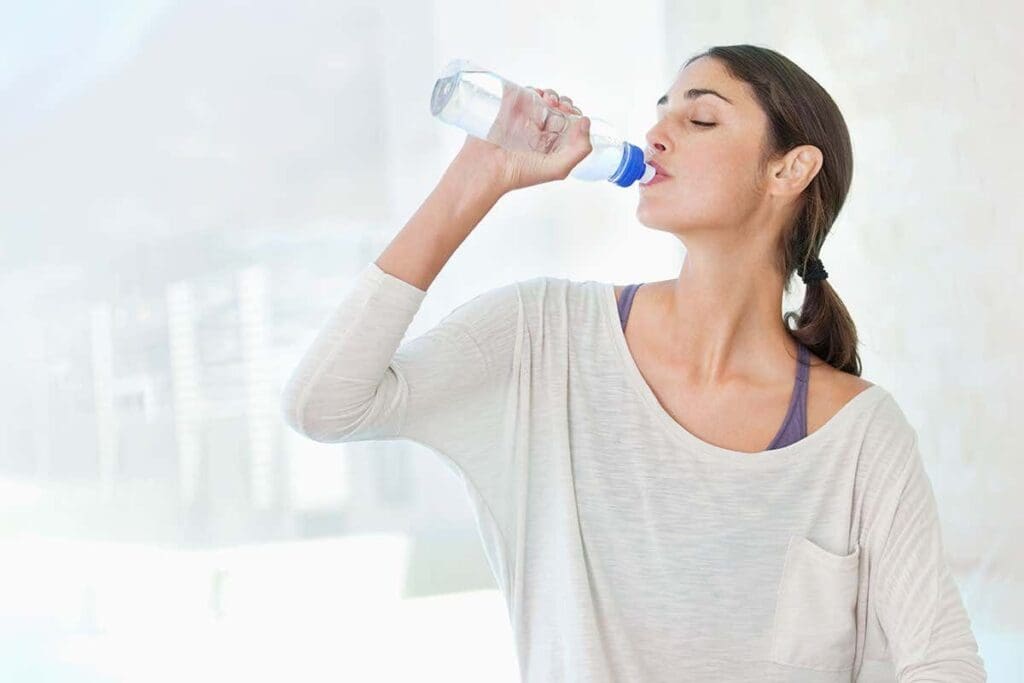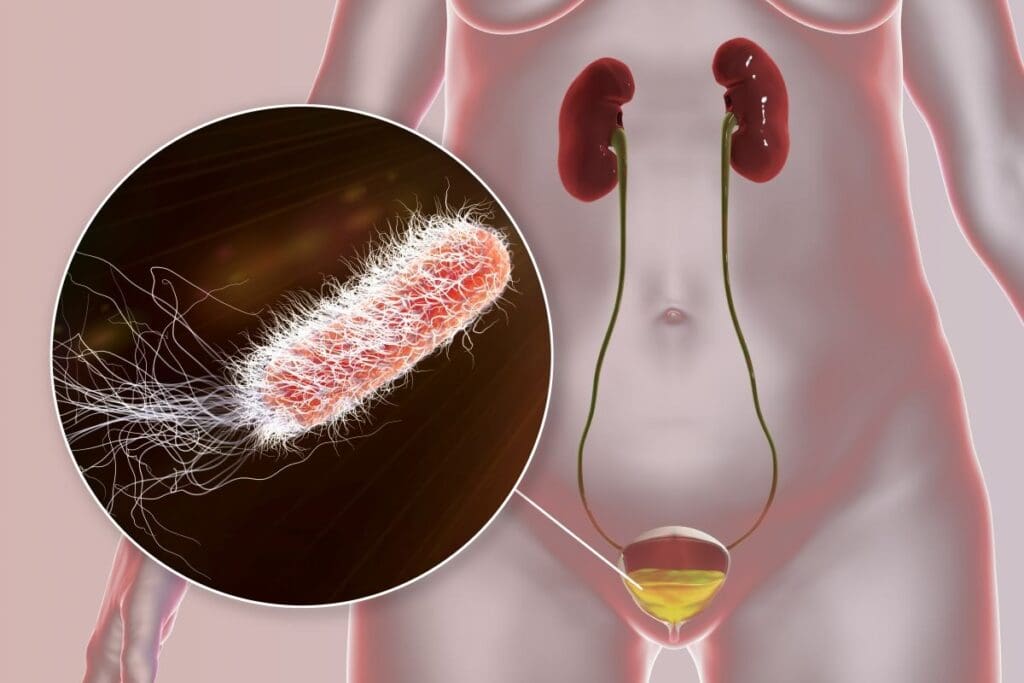Last Updated on November 25, 2025 by
Ever wondered How Long Does It Take to Pee After Drinking Water or how soon water moves from your glass to your bladder? We’ll dive into how fast and precisely your body’s hydration system works. When you drink water, it starts its journey through your digestive system. First, it goes into your stomach, where digestive enzymes mix with it.
But water is absorbed quickly, mainly in the small intestine. Then, it moves to the bloodstream.

Water absorption can start as early as 5 minutes after drinking. It reaches its peak around 20 minutes after drinking. Studies show that water goes into the bloodstream through the small intestine. It then goes to the kidneys, where it’s filtered into urine. This urine is then sent to the bladder — which helps explain how long does it take to pee after drinking water.
When you drink water, it starts a five-stage journey to your bladder. Knowing this can help us understand how our bodies use the water we drink.
The first step is in your mouth. Water is swallowed and goes down the esophagus to the stomach. This happens in about 5 minutes. Your stomach mixes the water with digestive enzymes, but doesn’t digest it itself.
Then, water moves to the small intestine. This is where most of the absorption happens. The small intestine has tiny projections called villi that help absorb water into the bloodstream.
In the small intestine, water is absorbed into the bloodstream through osmosis. This is where water becomes part of the circulatory system. It’s then carried to different parts of the body.
Water in the bloodstream goes to the kidneys for filtration. The kidneys help control water levels in the body by adjusting urine production. This stage is key to staying hydrated and healthy.
Understanding these stages shows how complex and vital the journey of water is in our bodies. It’s a fascinating process that keeps us well.
Drinking water starts a process that ends with us needing to pee. It’s interesting to see how long it takes. Our body works hard to make this happen.

Water starts its journey in our mouths. It takes 5-20 minutes for it to get into our bloodstream. This time can change based on how much water we drink and how fast our body processes it.
It usually takes 40 minutes for water to get to our bladder. This time can vary. It depends on how hydrated we are, our health, and how well our kidneys work.
Some people might need to pee sooner than 40 minutes. This can happen for many reasons. For example, if we’re already well-hydrated, our body might work faster to get rid of the water.
In summary, how long it takes to pee after drinking water varies. It depends on many factors. Understanding these helps us appreciate how our bodies keep us hydrated and healthy.
Knowing what affects how fast your body absorbs water is key to staying hydrated. Your hydration level, health, and age all play a part. These elements can change how your body uses water.
How hydrated you are affects how quickly your body absorbs water. If you’re dehydrated, you’ll drink water faster. But if you’re already hydrated, it might take longer. Drinking water regularly helps keep your body hydrated.
Everyone’s metabolism is different, which changes how fast water is processed. Your age, sex, weight, and how active you are can all affect your metabolism. For example, athletes might process water faster than less active people.
Your kidneys are key in filtering waste and balancing fluids. If your kidneys aren’t working well, it can slow down water processing. People with kidney problems might notice a difference in how they absorb water.
As we get older, our bodies change in ways that affect hydration. Older adults might find that their kidneys work less efficiently and their bodies process water differently.
Understanding these factors helps you manage your hydration better. For instance, knowing 1 liter of water is about 33.81 ounces makes tracking your water intake easier. Whether you’re hydrating during exercise or just keeping up with daily needs, knowing these factors is important.
Knowing how much your bladder can hold is key to staying hydrated. Your bladder is a big part of your urinary system. Learning about it helps you manage your water better.
Most adults can hold 16–24 ounces in their bladder. This amount can change based on age, health, and how much you drink. For example, doctors might use a “pee cup” to check bladder function.
Not everyone’s bladder is the same size. Age, sex, and health can affect how much urine it can hold. Usually, a healthy adult bladder can hold about 1-2 cups (16-24 ounces) of urine.
You usually feel the need to pee when your bladder is half full. This is your body’s way of telling you it’s time to get rid of waste. You’ll feel this urge when your bladder has about 8-12 ounces of urine.
When your bladder is half full, the muscles in the bladder start to contract. This sends a signal that it’s time to pee. How strong this feeling is can depend on how hydrated you are and your bladder’s health.
Water intake and urine output are closely linked. The body turns water and other fluids into urine. A healthy adult usually makes about 1.5 liters (or 710 mL) of urine a day.
Drinking water affects how long it stays in your stomach before being absorbed. On average, water is in your stomach for 5-20 minutes before being absorbed. Then, it goes to the kidneys, where it becomes urine, and then to the bladder.
It usually takes 8-9 hours for your bladder to fill up, assuming you drink normally. This time can change based on how much you drink, how active you are, and your health.
Knowing this timeline helps you manage your water better, which is important if you’re watching your urine output for health reasons. It helps you plan when to drink water.

Knowing how your body absorbs and uses water is key to a healthy bladder. We’ve looked at how water moves from your mouth to your bladder. We’ve also talked about what affects this journey.
At Liv Hospital, we aim to give top-notch healthcare and support to patients worldwide. By using what you’ve learned here, you can better manage your water intake. This helps your urinary health. The time it takes to pee after drinking water can vary. It depends on how hydrated you are and your kidney function.
To improve your hydration, listen to your body’s signs. Adjust your water intake based on these signals. This way, you can help your bladder and overall health. Our team is here to help you with personalized care and advice.
Water doesn’t get digested like food does. It’s mostly absorbed in the small intestine and then goes into the bloodstream. This process happens quite fast, usually in 5-20 minutes.
After drinking water, it first goes into your stomach. Then, it moves to the small intestine for absorption into the bloodstream. Next, it goes to the kidneys for filtration and ends up in the bladder.
Water isn’t digested like food. It’s absorbed quickly, mainly in the small intestine. We don’t really talk about “digesting” water; we focus on its absorption and use by the body.
It usually takes about 40 minutes for water to reach your bladder after drinking. But this time can change based on your hydration, health, and how fast your kidneys work.
The body absorbs water in the small intestine and then sends it to the kidneys through the bloodstream. The kidneys filter it, and it becomes urine, which goes to the bladder.
It generally takes around 40 minutes to pee after drinking water. But this can vary based on your hydration, health, and kidney function.
Again, water isn’t digested; it’s absorbed. This absorption happens quickly, in 5-20 minutes.
One liter of water is about 33.81 ounces.
Water doesn’t linger in the stomach. It’s quickly moved to the small intestine for absorption.
Water’s journey starts in the stomach. Then, it goes to the small intestine for absorption, into the bloodstream, and to the kidneys and bladder.
Water starts hydrating your body as soon as it’s absorbed. This can happen in 5-20 minutes after drinking.
About 33.81 ounces make one liter.
Subscribe to our e-newsletter to stay informed about the latest innovations in the world of health and exclusive offers!